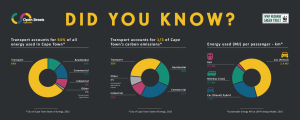We spend a large portion of our lives moving about, a significant percentage of our income too, and it directly affects the future of our planet. So how come we don’t think of transportation as a fundamental life issue in the same way we consider our personal health, financial stability and self-realisation?
More than 17% of a South African’s income goes to transport (according to Statistics South Africa) and, according to the fifth TomTom Traffic Index report, Cape Town motorists spend “152 extra hours a year behind the wheel because of traffic congestion”. Six days in traffic we will never get back!
There is plenty of discussion among motorists about the cost and inconvenience of getting around, but reasons for the seeming intractability of the problem dominate the conversation: “I would use public transport but, although a monthly train ticket is far cheaper than a month’s worth of petrol, it’s not reliable or safe. Beyond going to the shop, there is insufficient infrastructure to enable cycling and walking as a viable long-term means of mobility. Individual choice makes a negligible difference anyway. And besides, roads were meant to be used by cars so I’ll just have to put up with the traffic and the fumes.”
Imagine if we treated every social ill with the same level of despair and hopelessness. Terrible diseases would have gone uncured and little would have been achieved in enshrining human rights as societies evolved. Luckily some have felt the urgency to push for change even when solutions seemed out of reach.
The lesson here is that we must start somewhere.
As the mayor of Cape Town, Patricia de Lille, expressed in an opinion piece about Open Streets over the weekend, “radical change is required in the realm of mobility, as transportation accounts for a third of Cape Town’s carbon emissions and 64% of all energy used in the metropole”.

A public system that functions efficiently, safely and cheaply and that enables all to access the city and its amenities is the perfect solution. But an overhaul of the current system in the short term would not be affordable in South African cities.
Perhaps, then, tackling transport as a personal issue might uncover some pathways hitherto ignored or deemed absurd. After all, like many other activities in our daily lives, the way we move becomes habitual. And although changing habits is extremely difficult, the human experience shows that it is not only possible but also commendable. Indeed, big changes can be made in your life when actions are broken down into “manageable chunks”.
The big picture shows us frightening stats: current transport trends are a huge problem in South Africa, both for the environment and for our sanity as a society. The way forward is less clear, but here are some ideas for your consideration:
If you rely on your private vehicle, find out if there are opportunities to carpool to work once a month as an experiment. If you manage that, try taking public transport once a month as an exercise in understanding how it works. If you take the train, bus or taxi every day, write down what your main challenges are and reflect on what could be done to improve those particular issues. If you have a bicycle, use it for all trips under 5km during the weekends and try cycling to work once a month. If you walk during any part of your working day, write some reflections about the positive experiences you have one day out of the month and write the top three challenges. (If you feel inspired to share, please do so in the comments section below.)
Remember that recognising the problem is always the first step towards fixing it and, as in most behaviour change exercises, change doesn’t happen overnight. It takes experimenting with a few ideas and seeing how they feel. Not everything will work but those things that do, or that show promise, might just reveal the light at the end of the urban transport tunnel.
I strongly believe that Open Streets car-free days are among those experiments that can help trigger new thinking and hopefully small steps towards new behaviour. De Lille went on to say in her Weekend Argus op-ed that these days “provide a unique platform for methods of interaction and enjoyment that can help build strong communities and make them realise the power of collective action”.
On April 3 , we will be travelling to Mitchells Plain to create a car-free street. I invite you to leave your car at home and join us on Merrydale Avenue! How you get there and what you do while you’re there might just get you thinking about how we use our streets and how we move around Cape Town.


